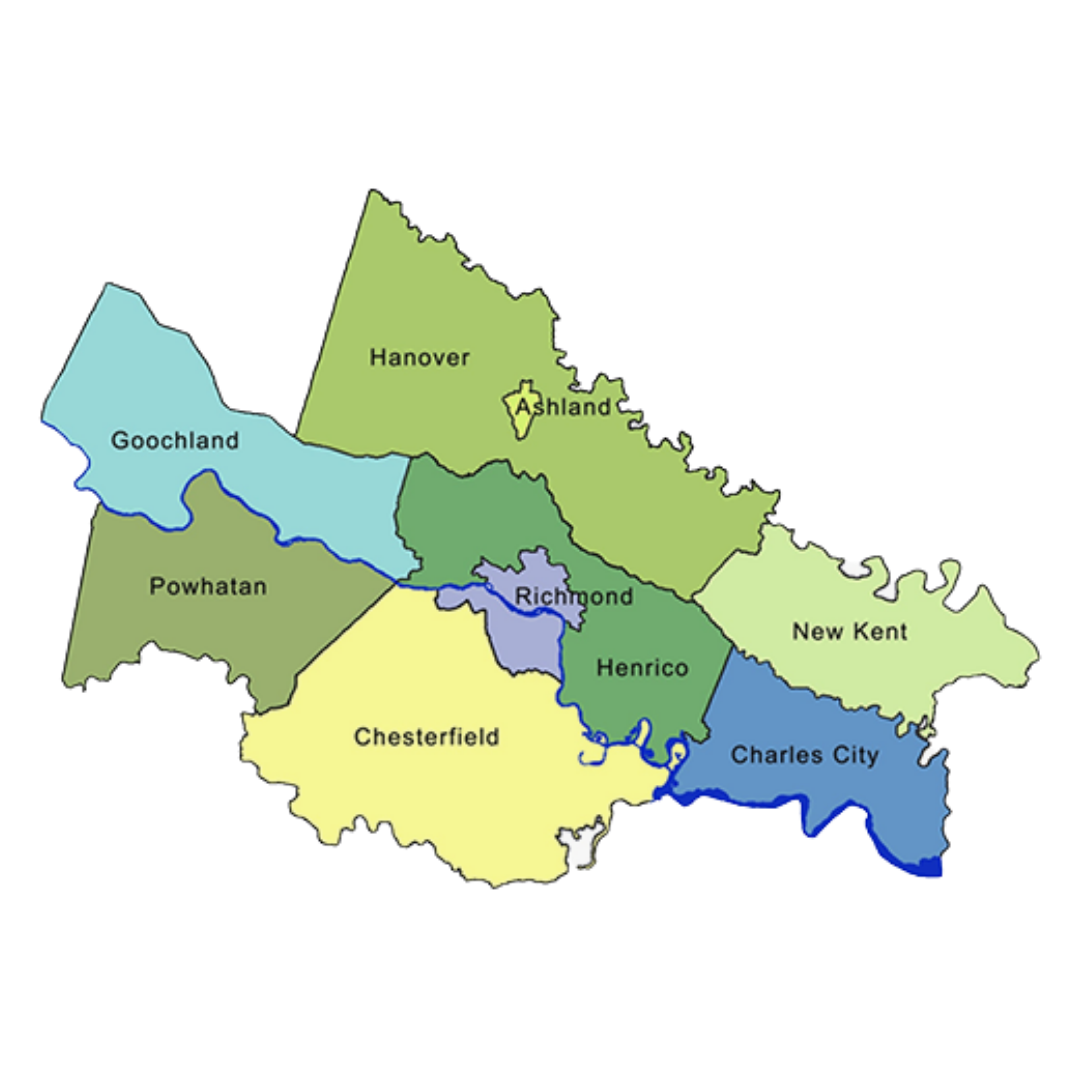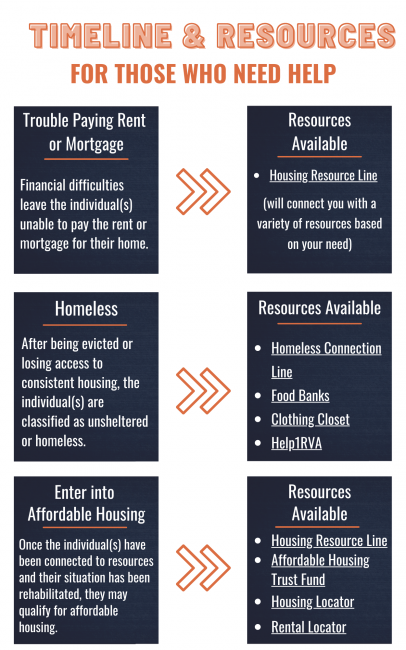Housing Resource Line: 804- 422-5061
Eviction Help Line: 1-833-663-8428
Homeless Connection Line: 804-972-0813
Homeless Connection Points GIS Map.
Greater Richmond Continuum of Care (CRCoC) partners list.
Zoom to view Homeless Connection Points in the City of Richmond. Those in need must go through GRCoC in order to be connected to a shelter.
Homelessness Services
The Richmond Region has a variety of resources for those who are homeless or are at risk of becoming homeless. The City's Human Services and Social Services staff and the Greater Richmond Continuum of Care (GRCoC) providers advocate weekly by connecting with the chronically homeless individuals who live on the City's streets, sidewalks, and public plazas, and other public spaces offering shelter and services. There are also many ways for volunteers to get involved and work with us to create a better future for all Richmonders. To view existing resources, click on one of the options below.

*Please note that the state of Virginia is not a "right to shelter" state, and the City of Richmond does not provide direct shelter or services to persons that are unsheltered. The city is part of the Greater Richmond Continuum of Care (GRCoC), and it is that entity that provides services and shelter to persons in need in the Greater Richmond Region.
What is the City doing to Address Homelessness?
The city is actively working with its partners to address the regional homelessness problem from the ground up. Dianne Wilmore, the city's homeless services liaison, and Hope RPD officers work with the Greater Richmond Continuum of Care (GRCoC) outreach providers to communicate weekly with persons unsheltered in the city, offering shelter and services to those who will accept help. It's not uncommon for unsheltered persons to reject that offer as shelters often require their residents to meet specific standards. For example, many shelters have a curfew, no-animal policy, restrict the use of drugs and alcohol, or only offer shelter to a particular gender for safety purposes. This issue is more relevant when the weather is mild, as some unsheltered persons are more comfortable staying outside and maintaining a lifestyle or habits that are not prohibited by shelters during specific seasons.
Looking forward, the city plans to continue to collaborate with our partners at the GRCoC to address homelessness by supporting eviction diversion, transitional housing, emergency shelter, and producing affordable housing opportunities. The city has created a collaborative strategic plan to end homelessness that provides a thorough history and outlines the obstacles specific to the Greater Richmond Region. In 2023, the city will establish a Community Resource Center that will act as a one-stop-shop for resources and information for the unsheltered. There will also be a rollout of the Ambassador's Program, which will provide citizens seeking help with a designated ambassador who will guide, monitor, and support the citizen until a resolution is found. This chart shows how GRCoC's efforts to reduce homelessness compare to other cities within the United States.
To learn more about how the city addresses homelessness or get involved, visit our advocates' page here.
Click here for a quick view of the many opportunities to donate, volunteer, or help throughout the unsheltered timeline.
The History of Homelessness
What is the definition of a person experiencing homelessness?
The U.S. Department of Housing and Urban Development (HUD) defines an individual who is homeless as lacking a fixed, regular, and adequate nighttime residence and includes those who are living in a shelter or a place not fit for human habitation (for example, a bench, a car, the sidewalk, or under a bridge), as well as people fleeing domestic violence and/or human trafficking when no subsequent residence has been identified. This formal and official guideline for an individual experiencing homelessness does not include the following situations:
- Those staying with family or friends
- Those living in a motel
- Those living in crowded or substandard conditions
How?
How do people become homeless, and how is the city combating these issues?
- Lack of Affordable Housing: Fair Market Rent of a 2-bedroom apartment is $1,163. To afford that cost, an individual needs full-time work at $20.18/hour.
- Shortage of Affordable Housing: The apartment vacancy rate in Richmond City dropped from 5.7% in 2020 to 2.1% in 2021.
- To address affordable housing, the city:
- Met its goal of providing 1,500 new units of affordable housing in the city three years early
- Established a dedicated source of funding for the Affordable Housing Trust Fund
- Tripled the allocation to the Affordable Housing Trust Fund since 2016
- Will utilize the dedicated funding stream for the Affordable Housing Trust Fund to help meet a 10,000 unit need over ten years – or 1,000 new units of affordable housing per year – partnering with the non-profit and private sectors
- Prioritized affordable housing in the Equity Agenda
- To address affordable housing, the city:
- Inadequate Income: Between 2014-18, the median household income in Richmond City was $45,117. Approximately 50% of households did not earn more than 3x the Fair Market Rent for a 2-bedroom apartment ($41,868).
- To address inadequate income, the city:
- Created new jobs and opportunities for Richmonders by attracting Babylon Micro-Farms, Vytal Studios, CoStar, and other companies to the city
- Has gone through the process to get the proposed Resort Casino on the November 2021 referendum; if approved, the Resort Casino would add 1,300 new jobs to Richmond's economy
- Founded the Richmond Resilience Initiative, the city's guaranteed income program that advocates for a living wage and a guaranteed quality of life for all Americans
- Plans to redevelop core areas of the City, prioritizing community benefits, such as green space, affordable housing, and job opportunities for Richmonders
- Prioritized economic justice and inequity in the Equity Agenda
- To address inadequate income, the city:
- Foreclosure and Eviction: The Greater Richmond Region has one of the highest eviction rates in the country, with the City of Richmond's eviction rate being 11.4%, ranking second among large cities in the country.
- To address foreclosure and eviction, the city:
- Founded the first of its kind in the Commonwealth Eviction Diversion Program, diverting evictions through targeted mediation between landlords and tenants
- Convened the Eviction Task Force
- Allocated millions of dollars in emergency aid to eviction diversion and rent relief programs during the pandemic
- Prioritized foreclosure and eviction prevention in the Equity Agenda
- To address foreclosure and eviction, the city:
- Poverty: People experiencing homelessness in the Richmond Region tend to have incomes between 0-30% of the adjusted median income, making accessing stable housing even more difficult.
- To address poverty, the city:
- Presented the Homelessness Strategic Plan to council, who adopted the plan
- Founded the Homelessness Advisory Council
- Will implement the Equitable and Affordable Housing Plan, which provides clear pathways to support both renters and homeowners.
- Prioritized solutions for poverty in the Equity Agenda
- To address poverty, the city:
- Racial Inequity and Discrimination: Black individuals have been and are currently disproportionately represented in regional counts of individuals experiencing homelessness.
- To address racial inequity and discrimination, the city:
- Championed workforce development programs through the Department of Parks, Recreation and Community Facilities and Office of Community Wealth Building
- Created the Community Ambassador program to act as trustworthy resident advocates for those who could benefit from city support or have feedback to offer
- Established an Office of Equitable Development to facilitate the creation of the more sustainable, beautiful, and equitable city envisioned by Richmonders in the master plan
- Will create an Equitable Economic Development Scorecard
- Prioritized solutions for racial inequity and discrimination in the Equity Agenda
- To address racial inequity and discrimination, the city:











